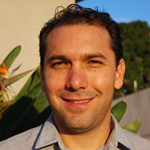 myCSUSM
myCSUSMBiography
I am an ethnographer who works at the intersection of environmental anthropology and critical ethnic studies, especially Latinx Studies. My interest in these fields started with my exposure to the natural environment from a very young age. Everyday life instilled within me a sense of love and wonder for the natural environment and informed my perception of how race, place, and power shape how we develop our relationship with and in our landscapes.
Most of my work explores the social and ecological processes that influence how and why different people experience the same locations differently. I am particularly interested in how race, place, and power converge to create opportunities for some and deny opportunities for others.
Education
University of Washington, Seattle, WA
Ph.D. Anthropology 2016
Dissertation Title: "Cultivating Subjectivities: The Class Politics of Convivial Labor in the Interstitial Spaces of Neoliberal Neglect"
Abstract: This dissertation explores home kitchen gardens and the role they play in the lives of a multi-ethnic, multi-lingual, community of diaspora and low-income residents in San José, CA. Home kitchen gardens cultivate a “moral economy of the home gardener” where people develop the necessary knowledge and skills as well as a capacity for autonomy to create new worlds while transforming existing ones through the intentional self-organization of direct lived experiences. Growing food for this group and many other precarious, diasporic, and working-class groups like them, is a means to self-determined and self-defined justice.
San José State University, San José, CA
M.A. Mexican American Studies 2009
Thesis Title: “Sustainable Tahoe: Bridging the Economic Gap”
Abstract: Lake Tahoe, CA is a region of competing interests over the meaning of sustainability. For developers and tourists, that means the redevelopment of old infrastructure, green building, eco-tourism, and the preservation of wilderness. For low-income and immigrant locals, sustainability is based on a working-class subjectivity rooted in environmental justice. Both ideologies continue to struggle as locals, developers, and tourists seek to develop a sense of place.
San Diego State University, CA
B.A. 2005 Chicana/o Studies
Research
Current Research: Much of the climate change and social justice discussions focus on inequality amplified by a changing climate, racist public policies, and income disparity. My research explores the same phenomena through the lens of privilege and how human and non-human actors at various scales collide and coalesce through varying power relations. Approximately every three minutes, we lose a football field of natural area to development, and nearly half of all rivers in the West have been altered by human activities. While some of these changes result from population growth, much is the result of privileged classes expanding into open areas. By focusing on privilege, my research asks profound questions about the nature of environmentalism by creating spaces for marginalized voices and perspectives. I am interested in how the overlapping issues of race, place, and power manifest in environmental discourse. My research focuses on the paradoxes of privilege as it is a symptom, a cause, and perhaps a possible cure for environmental injustice.
Courses
ENVS 301: Place, Power, & the Environment
ENVS 305: Resilience & Society
ENVS 325: Environmental Issues through Film
ENVS 340: Environmental Justice
ENVS 351: Leisure, Recreation, & the Environment (COMMING FALL 2021!)
ENVS 361: Diet & Planet
ENVS 464: Food Politics & the Environment
ENVS 490: Capstone in Environmental Studies
Vitae
Publications
Valle, Gabriel R. In Press. “To have a garden is against this system:” The revolutionary subjectivity of convivial labor for home kitchen gardeners in San José, CA.” In EJ in the Anthropocene: From (Un)Just Presents to Just Futures. Routledge.
Valle, Gabriel R. 2021. "The Past in the Present: What our Ancestors Taught us about Surviving Pandemics." Food Ethics Vol. 6, No. 2: 1-12.
Valle, Gabriel R. 2020. “Learning to Be Human Again: Being and Becoming in the Home Garden Commons.” Environment and Planning E: Nature and Space, (September 2020). https://doi.org/10.1177/2514848620961943.
Valle, Gabriel R. 2020. “Narratives of place: critical reflections on place-making in the curriculum of environmental studies and sciences (ESS)” Journal of Environmental Studies and Sciences, (March 2020) https://doi.org/10.1007/s13412-020-00598-6
Valle, Gabriel R. 2017. "Food Values: Urban kitchen gardens and working-class subjectivity." In Mexican-Origin Foods, Foodways, and Social Movements: A Decolonial Reader. Eds. Devon G. Peña, Pancho McFarland, Luz Calvo, and Gabriel R. Valle. University of Arkansas Press.
Peña, Devon G., Pancho McFarland, Luz Calvo, and Gabriel R. Valle eds. 2017. Mexican-Origin Foods, Foodways, and Social Movements: A Decolonial Reader. University of Arkansas.
Valle, Gabriel R. 2015. "Gardens of Sabotage: Work, Time, and the Speed of Capitalism" Aztlán Journal. Vol. 40: No. 1, Spring, pp. 63-86.
Valle, Gabriel R. 2011. "Lake Tahoe Development Creates ‘Poverty with a View’” in Race, Poverty and the Environment. Vol. 18 No. 1.






